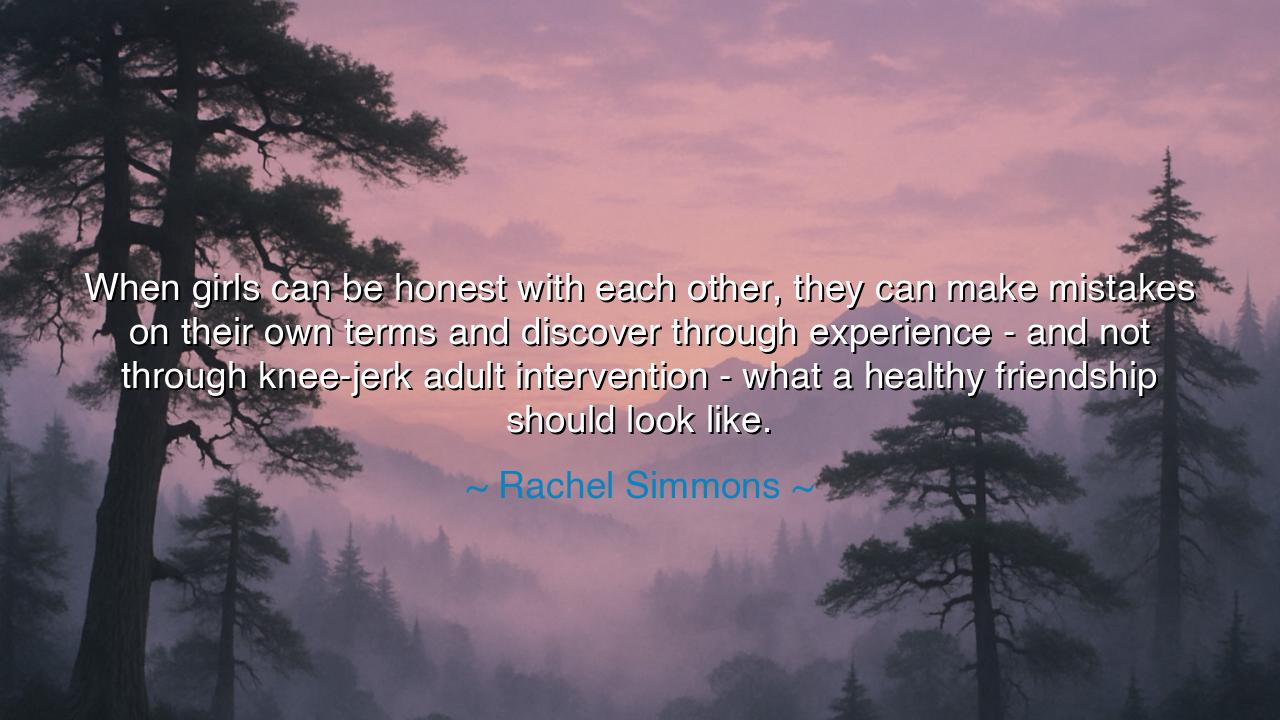
When girls can be honest with each other, they can make mistakes
When girls can be honest with each other, they can make mistakes on their own terms and discover through experience - and not through knee-jerk adult intervention - what a healthy friendship should look like.






In the sacred space of friendship, there is a truth that transcends time and age: the freedom to make mistakes is a crucial part of growth, especially for those who are still finding their way. Rachel Simmons, in her profound reflection, speaks of the power of honesty among girls—"When girls can be honest with each other, they can make mistakes on their own terms and discover through experience - and not through knee-jerk adult intervention - what a healthy friendship should look like." These words carry the weight of wisdom passed down through the ages: that true friendship is built not in the perfection of behavior, but in the freedom to learn, grow, and sometimes falter without fear of judgment or interference.
In the ancient world, the bonds between women were often tested in ways that required trust and autonomy. The great Greek philosopher Aristotle spoke of the importance of friendship as a bond grounded in mutual respect and shared virtue, but also of the necessity of personal experience in shaping one’s understanding of true virtue. The trials of youth, especially among women, were seen as a process of self-discovery, a journey where they learned not only about the world but about themselves. Just as Aristotle taught that one must engage with the world to learn wisdom, so too do girls, as Simmons suggests, need the space to learn through experience, without the constant intervention of those who may not understand their unique journey.
The journey of self-discovery is an essential part of the human experience, and it is often through mistakes and failures that we find our true strength. In the stories of ancient women, there were countless examples of resilience through hardship. The queen Artemisia, who fought in the ancient world’s battles, was known not just for her leadership, but for her courage in facing defeat and learning from her mistakes. She did not allow the failures of her early efforts to define her, but rather used them as stepping stones to a greater wisdom. Simmons' reflection mirrors this ancient truth—that it is through mistakes, made on one’s own terms, that we learn the deepest lessons about friendship, trust, and the value of true connection.
The intervention of adults—whether through overprotectiveness or well-meaning attempts to shield young people from hardship—often distorts the natural course of growth. Simmons speaks to the danger of adult intervention, which, though often well-intentioned, can rob girls of the chance to experience the lessons that only come through their own mistakes. Plato, in his writings, emphasized the need for personal experience to attain wisdom, and this idea extends into the realm of friendship. He taught that no external influence can replace the internal growth that comes from lived experience. Just as Plato encouraged individuals to seek their own paths to virtue, so too must young women be allowed to seek their own path to healthy friendships, free from the constraints of premature judgment.
In the realm of friendship, especially among young women, the opportunity to make mistakes without fear of judgment allows for the creation of authentic connections. Hippocrates, the father of medicine, spoke of the healing that comes not from avoiding suffering, but from confronting it directly. Friendships formed under the pressure of shared mistakes are the strongest, for they are built on the authenticity of one’s true self, not on the illusion of perfection. Just as the great warriors of the past learned to sharpen their swords through countless battles, so too do young women learn the true nature of healthy relationships by experiencing their ups and downs together.
The lesson for us all is clear: we must give space to young women—and indeed to all individuals—to explore, learn, and make mistakes without the constant specter of adult intervention. In our own lives, we are called to embrace authenticity in our relationships, recognizing that it is through imperfection that the deepest connections are formed. Simmons' words urge us to trust in the process of growth and to allow others the freedom to navigate their journeys without fear of constant correction or interference. It is through the freedom to fail and learn that we come to understand the true nature of friendship—a bond that does not seek to control or perfect, but to support, uplift, and grow alongside one another.
So let us follow this ancient wisdom: in our friendships, in our families, and in our communities, let us create spaces where individuals can grow through their own experiences—where mistakes are not feared, but embraced as part of the journey toward deeper wisdom and stronger bonds. Just as the ancients recognized the importance of personal experience in shaping the soul, so too must we understand that the true strength of friendship lies in the freedom to explore and discover, to learn through both the highs and the lows. May we give each other the space to grow, knowing that it is through this growth that we find the truest and most lasting connections.






AAdministratorAdministrator
Welcome, honored guests. Please leave a comment, we will respond soon